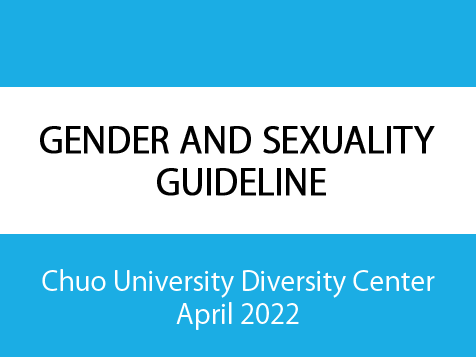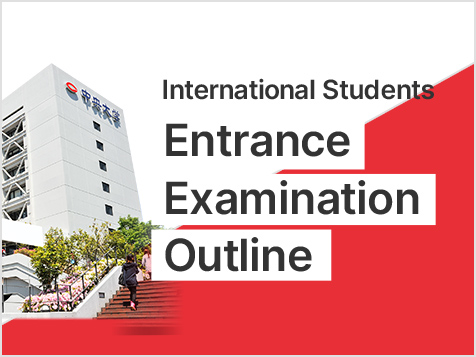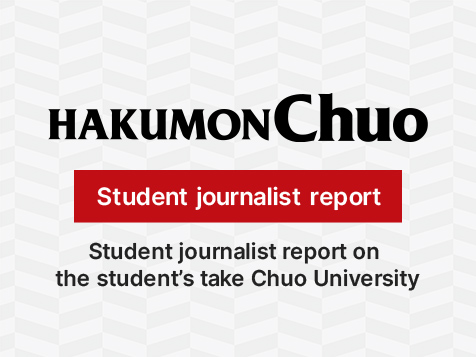Campus Life
Counseling
Student Counseling Service
The Student Counseling Service deals with the problems students may encounter in their campus life (scholastic performance, career, personal relations). Access is available through the Counseling Service to both counselors on the academic and administrative staff and contracted medical and legal counsel. In addition to counseling, other services, including training camp-style intensive seminars and sign language courses, are also offered through the Student Counseling Service.
Say NO to Harassment
Respecting the dignity of all individuals, Chuo University declares that it shall create and maintain a comfortable environment for education, research, and work that is free from harassment, and when harassment does occur, it shall take appropriate measures in a prompt manner.
Definition of Harassment at Chuo University
Harassment means any act by a person, making an inappropriate remark or behaving inappropriately with regard to another person’s personal attributes and/or personality, including their sex, sexual orientation, age, physical condition or characteristics, birthplace, familial relations, beliefs, nationality, ethnicity, race, occupation, or social position, in relation to education, research, or non-academic tasks, and thereby causing disadvantage or harm to that person, or violating their personal dignity or personality.
Types and content of Harassment
Types of harassment that may occur in education, research, or work situations are, for convenience, classified into the following three types: academic harassment, sexual harassment, and power harassment, other types being dealt separately.
However, although harassment may typically fall under one of the abovementioned types, it is often the case that multiple types of harassment are intertwined in a complicated way, making the boundaries between each type unclear.
Academic Harassment
Academic harassment is an unacceptable remark or behavior made by a person in a superior position in educational or research activities, thereby violating the personal dignity or personality of others, or inflicting pain or disadvantage.
As to whether the remark or behavior is academic harassment, regardless of the intention of the person who made the remark or carried out the behavior, whether the remark or behavior can be reasonably explained in the context of education, as well as objectively judged, is important.
Examples:
- Forcing a students or researchers to handle personal affairs or tasks that are unrelated to education or research; acting in a discriminatory manner and/or giving inappropriate evaluations when such demands are refused
- Reproaching in a loud voice or making offensive remarks against a person regarding insufficiencies in his or her research in a manner that exceeds the scope of appropriate guidance
Sexual Harassment
Infliction of emotional distress or physical harm with a sexual remark or behavior.
As to whether the remark or behavior is sexual harassment depends on whether the recipient feels discomfort, and an objective judgment is important as well.
Examples:
- Inviting a specific student to teacher's office or dinner, extracurricular activity, social meeting, or the like, taking advantage of a situation in which it is difficult for the person to refuse
- Making remarks based on gender stereotypes, such as 'A man/woman should behave like this’
- Making a lewd remark about another person or making a sexual remark about another person’s appearance
Power Harassment
Actions or language during university activities, by a person in a superior position taking advantage of their position or experience, that violates the dignity or personality of others during work duties, demotivates others, or worsens the work environment.
Regardless of the intention of the person who made the remark or carried out the behavior, to determine whether it is power harassment, a reasonable explanation of the remark or behavior, or an objective decision, is required.
Examples:
- Repeatedly mentioning shortcomings or mistakes in the performance of duties of a person or rebuking in a loud voice in public
- Assigning an unreasonable task to a particular person, not establishing a cooperative structure, and making the person work alone until very late at night
- Forcing a person to participate in a drinking party or the like
Other types of harassment
Sexual Orientation and Gender Identity (SOGI) harassment
Ridiculing sexual minorities, such as homosexuals or transgender persons, and causing discomfort, or revealing their secrets
Alcohol harassment
Forcing someone to drink alcohol
Moral harassment
Violating personal dignity by words, behavior, or texts, not by force
Dating Violence
Physical, mental, sexual, or financial abuse against a person in a romantic or intimate relationship
Declaration of Harassment Prevention
Respecting the dignity of individuals in accordance with the spirit of the Constitution of Japan, Chuo University Educational Corporation hereby establishes the Guidelines for Harassment Prevention, in order to create and maintain a comfortable environment for education (including learning and study), research, and work for all the members of Chuo, such as students and faculty members and non-academic workers.
As an educational and research organization aiming to develop human resources with a rich personality and global mindedness, Chuo shall be conscious of its responsibility in ensuring an environment where people can respect each other’s personality and shall strive to create and maintain a comfortable environment for education, research, and work that is free of harassment. To this end, Chuo hereby declares that it shall strive to make Members aware of these Guidelines and ensure that they are abided by, create an environment where Members can seek consultation regarding harassment without any worries or concerns, respect the privacy of complainants and related persons, strictly observe confidentiality, and take appropriate measures with regard to investigation into the fact, victim support for recovery, prevention of recurrence, and other matters in a prompt manner.
(From Chuo University Guidelines for Harassment Prevention)
Harassment Consultation
If you think you are being harassed...
A person who conducts harassment is liable. Do not blame yourself. However, if you just endure, the situation will not improve. Your actions, including consultation, will lead to a solution for harassment.
Check
If someone yells at you, it may be too soon to judge you are harassed by a single instance of yelling. If you have some doubt, ask the person about the background, reasons, or feelings that caused a remark or behavior.
Say NO
You have the right to express your feelings of discomfort with words or through your actions. Communicate your feelings to the person clearly and directly. Be assertive when talking to others.
“Assertive” means:
An honest and appropriate expression of your opinions or feelings, while respecting others. Using “I” as the subject of a sentence, such as “I was uncomfortable being told that,” you can express your feelings clearly without blaming the other person.
Help (when you cannot say NO)
If it is difficult to express your feelings clearly or to say “no,” ask a close friend, teacher, university senior, or a supervisor to warn the person. Do not try to fix a difficult situation by yourself. Asking for help from an appropriate person is a mature coping strategy.
Consultation
If the person does not stop the words or actions, it is possibly harassment. Before the situation becomes worse, be sure to consult a reliable person, or harassment consultation desks.
Record
Keep detailed records regarding the harm, such as when, where, by who, and what you thought. Actual records, such as LINE messages, emails, and voice records will help find a solution.
Witnesses of harassment
Looking the other way encourages harassment and harassers. If possible, warn a harasser on the spot. You can help by asking the victim what they want to do.
Anyone may, albeit unconsciously, make inappropriate remarks or behave inappropriately in the eyes of others. Let us all be aware of the risks of harassment, and build relationships in which we can alert one another of acts of harassment.
Harassment Consultation Desks
If you feel that you are being harassed, or if you witness harassment, please contact the harassment consultation desks by phone, e-mail, letter, etc. The Chuo University Harassment Consultation Desks are there to help any member of Chuo University.
Select the most convenient desk for you
■Harassment Prevention Committee Support Desk
Please make an appointment in advance for a consultation
Tel: 042-674-3507
Email:harass-soudan-grp@g.chuo-u.ac.jp
Postal address: 742-1 Higashinakano, Hachioji-shi, Tokyo 192-0393 Japan
■Student Counseling Center
Tel: 042-674-3481 (Tama Campus)
Tel: 03-3817-1724 (Korakuen Campus)
Tel: 03-5978-4222(Myogadani Campus)
Tel: 03-3513-0309 (Ichigaya Tamachi Campus)
■Office of the Professional Graduate Schools
Tel: 03-6261-8521 (Chuo Law School)
Tel: 03-6261-8522 (Chuo Graduate School of Strategic Management)
■Office of the Distance Learning Division
Tel: 042-674-2347









